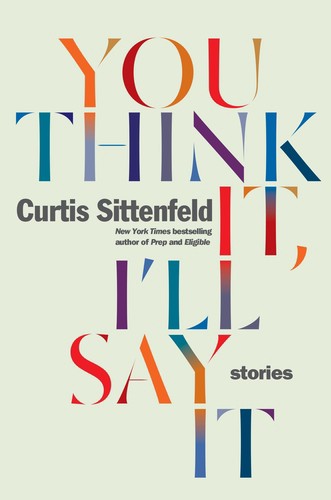Interviews
Do Sophisticated Midwesterners Exist?
Curtis Sittenfeld, author of “You Think It, I’ll Say It,” demolishes the myth of the uncultured heartland

Curtis Sittenfeld is best known for writing American Wife, a fictionalized memoir inspired by Laura Bush. Some might call her the First Lady of writing about First Ladies but her short story collection, You Think It, I’ll Say It, showcases how wide her talents reach and brings to mind a different type of title: the chronicler-in-chief of the mind of a certain type of American woman.

Sittenfeld acknowledges that she can only speak for a specific strata of society, but her command of that voice and thought is all-encompassing. Reading her work is like eavesdropping on the most observant women you know having a conversation about people you’ve never met, and having that conversation somehow become thrilling beyond comprehension.
If you read the book, you’ll doubtlessly find a thread that resonates deeply with an aspect of your interpersonal life. For me it was the way Sittenfeld grasps the miscommunications of early intimacy, but for you it might be her stark look at the awkwardness of couples who cannot understand their partners’ psyche, or identifying with characters who reveal their meanest inner impulses. In a world where judgment is often seen as solely harsh, Sittenfeld reminds us that the ability to discern and judge others can be a useful tool in both survival and the creation of empathy.
Sittenfeld and I spoke on the phone about social performance, representations of the Midwest in media, and ambiguity in fiction.

Rebecca Schuh: In the first story in the book, “Gender Studies,” Nell seems more resigned than sad about her divorce. Why is that?
Curtis Sittenfeld: I write fiction pretty intuitively. I try to not go in the most predictable direction. Writing about someone who’s really devastated about their breakup, there are ways to do it that are interesting, but it does seem predictable. It’s weirder but plausible that she would almost think, well, maybe I should have broken up with him, or maybe I should have known, instead of being destroyed by it.
RS: Yeah that definitely makes sense, it was really refreshing to read someone like that. In that story as well, there’s these notes of her casual elitism but she kind of also acknowledges that her and her ex had this kind of insufferable lifestyle. How does that relates to your fiction as a whole of characters working to overcome their immediate notions of privilege?
CS: I’m not always sure that they’re working to overcome it. I do think that I write about characters who tend to be educated and relatively privileged. We live in such complex interesting times, one thing I’m sort of curious about is if I can do justice to a character and justice to a story, I can write about any topic if I can pull it off. If I wrote about someone who came from a very impoverished socioeconomic background, in some ways I think I would be opening myself up to more criticism or a different kind of criticism from the kind I open myself up to by consistently writing about privileged white women.
I think that the Midwest feels a bit underrepresented to me in fiction, and I think sometimes if there’s a Midwestern character, they’re supposed to be someone who is naive. I like staking out as my territory the sophisticated although also flawed Midwesterners. I really think that a lot of the people who live on the coasts don’t think that emotionally sophisticated Midwesterners exist.
The Midwest feels underrepresented in fiction, and if there’s a Midwestern character, they’re supposed to be naive. My territory is the sophisticated but also flawed Midwesterners.
RS: Lately it seems like when newspapers are going to the Midwest, they’re finding the sympathetic profile of the Trump supporter. And that’s not all that the Midwest is. I’m from Madison, Wisconsin so obviously I have kind of a skewed perspective, but it’s a strange thing to watch in the media.
CS: I agree 100%. There are a lot of those articles where a journalist from a coast comes in like a foreign exchange student and spends 2 or 3 days in the Midwest and a lot of those pieces read to me like the person came in with an agenda and essentially knew how the piece would be written before it was written. It’s really not at all difficult to find people who supported Hillary Clinton all over the Midwest.
Politically I don’t think that there is a coastal versus central divide, it’s an urban versus rural divide. I live in Missouri, the politics of St. Louis and Kansas City are different from the politics elsewhere in Missouri, or for you in Wisconsin, even though you’re visiting.
Stop Dismissing Midwestern Literature
RS: I was struck by the universality of the miscommunication in “The World Has Many Butterflies.” It’s so common to have these interactions where it seems like there’s a mutual attraction but it’s actually one sided. Did you perceive Graham as leading Julie on, or Julie being more delusional, or neither of those, or both?
CS: I definitely want it to be open to interpretation. I want the reader to choose which version is real. I like ambiguity in fiction because I think ambiguity is so common in real life, and people’s motives can be very unclear. Even to the people themselves. In some ways all stories are more interesting if you can’t tell who’s clearly right or wrong.
All stories are more interesting if you can’t tell who’s clearly right or wrong.
RS: That idea came up again, but in a less romantic context, in “Vox Clamantis in Deserto.” The narrator says, “I’d invented my original idea of Rae,” I thought that was kind of a similar thing in terms of characters seeing in other people what they wanted to see. I was wondering about the connection you found between that happening both romantically and in a friendship in this story.
CS: As a side note, do you know what Vox Clamantis in Deserto means?
RS: No.
CS: It’s the motto of Dartmouth, and it means a voice crying out in the wilderness. I think that it’s very natural to interact with people and whether it’s conscious or subconscious, to kind of create a narrative about them or to explain their behavior to yourself and their motives. Depending upon the people involved, maybe that initial narrative is correct or maybe it’s completely wrong. There are times in my life when I’ve had a first impression that later turned out to be totally contradicted, and there’s times when I’ve had first impressions that turned out to be confirmed over the course of time.
It’s really confusing to be a person. I feel more this way now than I did even ten or twenty years ago. It’s really hard to understand the reasons that other people act the way they do. Somebody might be grouchy because they’re fundamentally an asshole, they might be grouchy because they’re going through some kind of incredibly challenging personal situation, they might be grouchy because they’re hungry. Other people’s behavior is very hard to read and to put into context even though essentially reading other people’s behavior is almost professionally what I’m supposed to do.
RS: This miscommunication of behavior is such a common theme throughout the book especially in the stories where people misunderstanding each other were married. I was so astonished at that. I’m not married and I’ve assumed oh once you get to that point, you for sure understand the other person. But it seems like what you’re reflecting in the stories is that it’s actually very common for married people to not understand each other.
CS: One of my motives for writing some of these stories is that I think that any marriage is very difficult to really understand from the outside, only the two people have a clear idea of what’s going on. I’m almost imagining scenarios for different marriages by writing fiction.
RS: Throughout the collection it seems as if the characters were often enacting social performances. In some of the stories we see that veil fall away. How do you relate the idea of social performance in everyday life to fiction?
CS: I think about this in terms of real life and also in terms of social media. We all have two fake selves now, we have our social media fake self and our flesh and blood fake self. Being fake some of the time is not inherently bad. I think it’s actually a form of good manners. I write from a point of confusion rather than a point of clarity and I don’t know where the sort of cut off is for the ideal amount of fake public behavior. And when does it go from being appropriate to being excessive to being unhealthy to being pathological. I’m trying to explore that issue.
We all have two fake selves now, we have our social media fake self and our flesh and blood fake self. Being fake some of the time is not inherently bad, but when does it go from being appropriate to being excessive to being unhealthy to being pathological?
RS: I hadn’t thought about it that way before. That’s such a great way to think of it because there’s a lot in the stories about this idea of suburban fakery and then also intellectual fakery, and then there’s the online aspect. What is the point at which it becomes too absurd and at what point is it that it’s how you survive in the world.
CS: You could say brushing your hair is a form of fakeness, or an artifice. But I’m okay with brushing my hair.
RS: Everything to a certain extent is an artifice but yeah it’s just like getting through the day and going to a job. In both “Plausible Deniability” and “The World Has Many Butterflies,” there’s a male character who sees no romance in a situation where the woman is thinking like this is a budding intimate connection. And I was torn between, oh is this men who are actually able to divorce emotion from intimacy or if it was notes of repressing that intimacy.
CS: In both the stories, what the dynamic is between a man and a woman is open to interpretation. And so I’m fine with different readers interpreting it differently, and if somebody said ‘well which character is right’, I wouldn’t really say either one of them is right or wrong.
RS: You were traveling between characters who were very overcritical of other people, such as in “Volunteers Are Shining Stars,” and characters who were being overly critical of themselves.
CS: Why choose! You can be both! The New York Times review of this book ran a week ago and asked the question: is a judgmental character redeemed by sort of recognizing that she herself is judgmental? And that depends on the reader.
RS: I found myself having sympathy for all of the characters and thinking wow, these are all just very messy personal interactions. Seeing both sides of that is such a valuable thing, it helped me to think about all of these situations that I’ve been worrying about in my own life and realizing that we’re all just kind of floundering around.
CS: I think that’s true. I think we are!








